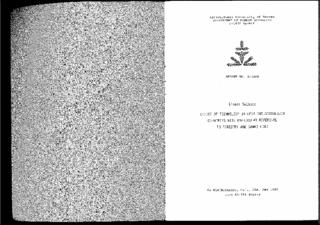Choice of technology in less industrialized countries with particular reference to forestry and sawmilling
Doctoral thesis
Permanent lenke
https://hdl.handle.net/11250/2676040Utgivelsesdato
1988Metadata
Vis full innførselSamlinger
Sammendrag
An overview is given of existing works regarding choice of technology in less industrialized countries (LIC), with special emphasis on forestry and forest industry projects. Some omportant theoretical aspects regarding the concept of technology and its role in economic development in LIC are discussed. Different methods for analysing socio-economic consequences of technological choice at the project level in LIC are discussed, and a multi-criteria simulation model is proposed. This model is used in an actual project in Tanzania to evaluate the appropriateness of the technological choice in the project, and to increase the empirical evidence concerning consequences of technological alternatives in LIC in general and in the forest sector in particular. Three operations in the project are analysed: skidding of logs from softwood (Pinus patula) thinnings and clearfellings, and sawmilling of softwood (Pinus patula). It is found that in all three cases the labour intensive technologies are highly compatible with the more modern, capital intensive alternatives considered, both regarding cost efficiency as well as other important development criteria like employment, working conditions, distributional effects, integration, independency, ecological effects, and risks. Finally, it is discussed how to arrive at appropriate technological choices in future development projects, with special reference to the forest sector.
Beskrivelse
Dr. agric thesis, NLH/Berkeley

